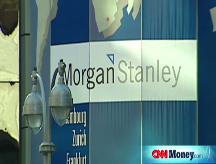Stocks slip on economic woes
Wall Street ends a tough session lower as investors weigh weak consumer confidence and housing reports ahead of the Fed decision.

NEW YORK (CNNMoney.com) -- Stocks ended lower Tuesday after a volatile session in which reports showing further erosion in consumer confidence and home prices rattled investors ahead of the latest interest-rate decision from the Federal Reserve.
The Dow Jones industrial average (INDU) and the broader Standard & Poor's 500 (SPX) index both lost almost 0.3%. The tech-heavy Nasdaq composite (COMP) lost 0.7%.
Stocks were choppy throughout the session, falling to the worst levels of the day after the mid-morning release of the June consumer confidence index and briefly turning positive near midday on a rally in bank and auto stocks. But the recovery attempt petered out by the afternoon.
Investors were also likely reluctant to move much as the two-day Fed policy meeting got under way. Central bank policymakers are expected to hold a key short-term interest rate steady at 2%, with a decision due Wednesday afternoon. The closely watched statement is expected to reflect the tug-of-war between a slowing economy and rising pricing pressures.
Ahead of the Fed meeting, reports are due on durable goods orders, new home sales and the weekly crude inventories report.
The combination of weak growth and higher prices is likely to keep the market under water for the foreseeable future. But toward the end of the year, there should be a turn, said Ralph Parks, president and CEO at Ralph Parks Investment Group.
"I'd say that about six months from now, the market should be stronger and the economy should start to pick up, since the market reflects the economy," Parks said.
However, he said that for the time being, the financial sector will continue to play the role of the "hangnail" of the market.
Economic news: The Conference Board's Consumer Confidence index fell to 50.4 in June, the fifth-lowest level ever, from 58.1 in the prior month. Economists thought it would fall to 56.
"It was a terrible report," said Joshua Shapiro, chief U.S. economist at Maria Fiorini Ramirez Inc.
He said the report reflects fears associated with a weakening labor market, the ongoing erosion in the housing market, and the rise in energy prices and other inflationary pressures.
"Clearly the message is that the tax rebates are not impressive in terms of how that relates to the future," Shapiro said, with investors realizing that the economic stimulus is a temporary fix.
Another report showed continued erosion in home prices.
The S&P/Case-Shiller 20-city Home Price index for April fell 1.4% from March and 15.3% from a year earlier. Both drops were smaller than economists had expected, but nonetheless reflected the ongoing slide in prices amid the housing market fallout. (Full story).
Wall Street economists expect 2009 growth at a 2.2% annualized rate, twice this year's projected expansion, according to a financial industry trade group survey released Thursday.
Stock movers: Stocks that are at the mercy of a weakening economy or higher fuel prices led the list of losers.
Alcoa (AA, Fortune 500), Caterpillar (CAT, Fortune 500) and DuPont (DD, Fortune 500) were the biggest Dow 30 decliners.
Airline, railroad and trucking stocks slumped, dragging down the Dow Jones transportation average by 1.9%.
UPS (UPS, Fortune 500) cut its second-quarter earnings forecast after the close Monday, citing slower economic growth and higher fuel costs. Shares fell 6% Tuesday.
Financials, automakers and other stocks beaten down in the recent selloff managed to bounce back Tuesday.
Bank of America (BAC, Fortune 500), Citigroup (C, Fortune 500), JP Morgan Chase (JPM, Fortune 500), Wells Fargo (WFC, Fortune 500) and Wachovia (WB, Fortune 500) were among the financial sector advancers.
General Motors (GM, Fortune 500) gained, after sliding for several sessions on concerns about the industry's cash position. The automaker said late Monday that it was boosting prices on 2009 models, cutting SUV and truck production, and holding a one-week sale to clear out high inventories of select vehicles.
Grocery chain Kroger (KR, Fortune 500) reported better-than-expected earnings of 58 cents per share, sending its stock 7% higher.
Eastman Kodak (EK, Fortune 500) surged 13.7% after the photographic-products maker said it would buy back up to $1 billion of its stock through the end of next year.
Market breadth was negative. On the New York Stock Exchange, losers beat winners 2 to 1 on volume of 1.34 billion shares. On the Nasdaq, decliners topped advancers 7 to 3 on volume of 2.2 billion shares.
Oil prices rise: U.S. light crude oil for August delivery rose 26 cents to settle at $137 a barrel on the New York Mercantile Exchange.
Other markets: In currency trading, the dollar declined versus the euro and the yen.
In the bond market, Treasury prices rose modestly, lowering the yield on the benchmark 10-year note to 4.10% from 4.16% late Monday. Bond prices and yields move in opposite directions.
COMEX gold for August delivery rose $4.40 to settle at $891.60 an ounce.
The national average price for a gallon of regular unleaded gas fell to $4.069 from $4.072 the previous day, according to AAA. (Full story). ![]()




